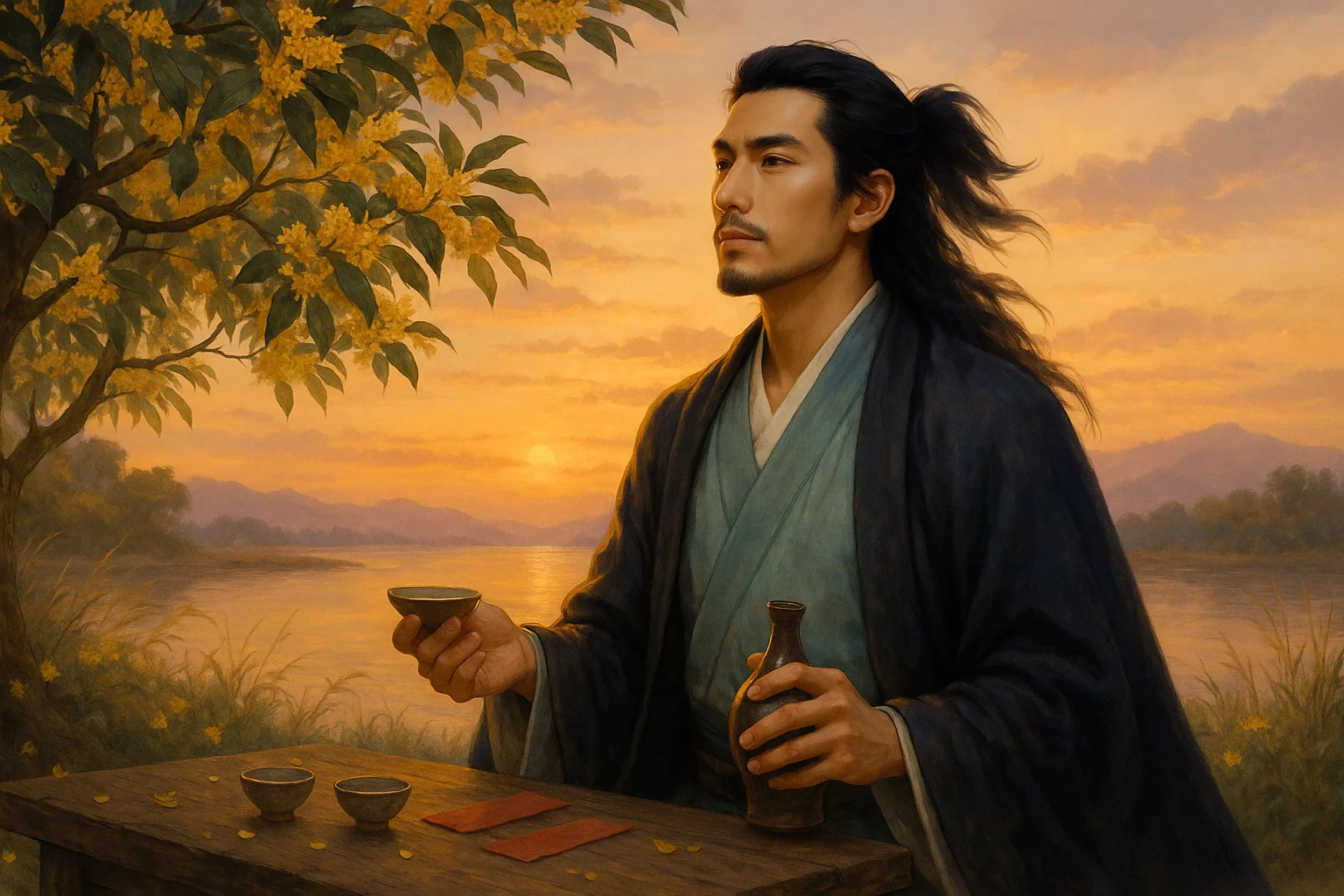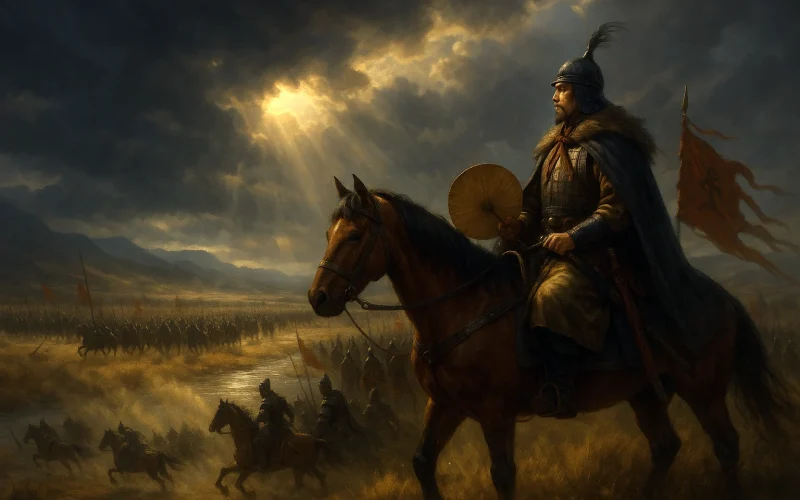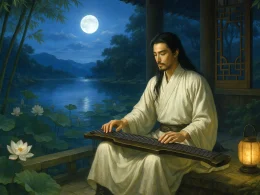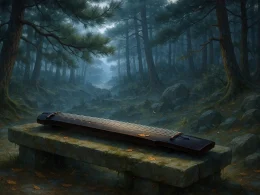Ten thousand horses stand silent,
A single cold horn blast—
Orders pierce the willow camp.
Autumn field flat as a palm,
Spears and swords thrust sudden,
Iron cavalry charge like shooting stars,
Battle formations stretch boundless.
In the oiled command tent,
He directs all strategies,
Feather fan swaying, fur robe light.
Do you not know—
This Shanxi-born commander,
Once tied poetry alliances?
Dragon-snakes leap from his scrolls,
Brushstrokes astound like storm at feast.
Though he may march beyond the sands,
Earn fiefdoms ten thousand miles,
Seal gold as big as a dipper—
None would satisfy his soul.
He wipes the sword at his waist,
Hair-splitting blade thirsts for blood—
"Until Loulan's chief is slain,
This heart knows no peace!"
Returning late at night,
Army drums and pipes resound—
Already tinged with frontier's grief.
Original Poem
「沁园春 · 张路分秋阅」
万马不嘶,一声寒角,令行柳营。
见秋原如掌,枪刀突出,星驰铁骑,阵势纵横。
人在油幢,戎韬总制,羽扇从容裘带轻。
君知否,是山西将种,曾系诗盟。龙蛇纸上飞腾。看落笔四筵风雨惊。
刘过
便尘沙出塞,封侯万里,印金如斗,未惬平生。
拂拭腰间,吹毛剑在,不斩楼兰心不平。
归来晚,听随军鼓吹,已带边声。
Interpretation
Composed by Liu Guo after observing General Zhang Lufen's autumn military drills, this ci embodies the Southern Song patriot's fervor for northern reconquest. Though never holding office, Liu channeled his devotion into verses celebrating martial readiness. General Zhang—a rare scholar-warrior—becomes the poem's living symbol of cultural-military synthesis, reflecting Liu's ideal of "civil governance and martial prowess" (文武兼备) as China's salvation.
First Stanza: "万马不嘶,一声寒角,令行柳营。见秋原如掌,枪刀突出,星驰铁骑,阵势纵横。人在油幢,戎韬总制,羽扇从容裘带轻。君知否,是山西将种,曾系诗盟。"
Wàn mǎ bù sī, yī shēng hán jiǎo, lìng xíng liǔ yíng. Jiàn qiū yuán rú zhǎng, qiāng dāo tū chū, xīng chí tiě qí, zhèn shì zòng héng. Rén zài yóu chuáng, róng tāo zǒng zhì, yǔ shàn cóng róng qiú dài qīng. Jūn zhī fǒu, shì shān xī jiàng zhǒng, céng xì shī méng.
Ten thousand soundless steeds;
one cold horn-cry
commands the willow camp.
Autumn plains stretch palm-flat—
spears and blades pierce the horizon,
starlit cavalry charge,
battle formations surge.
From his command tent,
he masters war's design,
feather fan's calm sway,
sable robe light.
Know you why?
Shanxi's martial bloodline—
once bound by poetry's pact.
The stanza orchestrates a symphony of disciplined power. "Soundless steeds" (万马不嘶) evoke coiled energy before the "horn-cry" (寒角) triggers explosive motion. "Starlit cavalry" (星驰铁骑) transforms soldiers into celestial forces, while the general's "feather fan" (羽扇) channels Zhuge Liang's legendary composure. The revelation of his poetic past ("bound by poetry's pact") fuses civil and martial excellence—a living rebuttal to Song's civil-military divide.
Second Stanza: "龙蛇纸上飞腾。看落笔四筵风雨惊。便尘沙出塞,封侯万里,印金如斗,未惬平生。拂拭腰间,吹毛剑在,不斩楼兰心不平。归来晚,听随军鼓吹,已带边声。"
Lóng shé zhǐ shàng fēi téng. Kàn luò bǐ sì yán fēng yǔ jīng. Biàn chén shā chū sài, fēng hóu wàn lǐ, yìn jīn rú dǒu, wèi qiè píng shēng. Fú shì yāo jiān, chuī máo jiàn zài, bù zhǎn lóu lán xīn bù píng. Guī lái wǎn, tīng suí jūn gǔ chuī, yǐ dài biān shēng.
Dragon-snakes writhe on scrolls—
his brushstrokes make
storms roar through banquet halls.
Were he to conquer deserts,
earn marquisate miles away,
win conquerors' seals like stars—
still his heart would starve.
He wipes the blade
at his waist—
that hair-splitting sword—
"Till Loulan's foe is slain,
my soul finds no peace."
Returning late,
army drums and horns
now throb with frontier's pulse.
The stanza unveils the warrior-scholar's paradox. "Dragon-snakes writhing" (龙蛇飞腾) captures calligraphic ferocity, while "conquerors' seals like stars" (印金如斗) reduces imperial rewards to cosmic baubles. The "hair-splitting sword" (吹毛剑) becomes an extension of moral resolve—its edge sharpening against compromise. The finale's "frontier pulse" (边声) in army music transcends acoustics, becoming the heartbeat of unconquered lands.
Holistic Appreciation
Liu constructs a diptych of discipline and desire. The first stanza's geometric perfection ("battle formations surge") mirrors Confucian order, while the second's "writhe on scrolls" unleashes Daoist dynamism. General Zhang embodies their synthesis: his "feather fan's calm" governs chaos, yet his "unslain soul" burns with righteous fury.
The poem's climax—"frontier pulse in army music"—performs acoustic alchemy. Campaign instruments absorb northern landscapes' essence, transforming musical notes into territorial claims. Liu's genius lies in making sound geopolitical: the horns' vibration becomes China's unfinished symphony of reunification.
Artistic Merits
- Thermal Imagery
"Cold horn-cry" (寒角) versus "unslain soul" (心不平) contrasts external control with internal fire. - Calligraphic Warfare
"Dragon-snakes writhe" (龙蛇飞腾) merges artistic and martial energy, ink becoming imagined blood. - Haptic Symbolism
"Wiping the blade" (拂拭腰间) ritualizes preparation, turning maintenance into moral vigilance. - Sonic Cartography
"Frontier pulse" (边声) maps unconquered territory onto auditory vibrations, making music territorial.
Insights
Liu's poem reveals how true strategy lives between brush and blade. General Zhang's "unslain soul" teaches that fulfillment comes not from rewards ("seals like stars") but from unrealized ideals—a lesson for modern pursuits where achievement often dulls purpose.
The "frontier pulse" in departing music offers another revelation: that borders are maintained not just by soldiers but by cultural memory. Those horns absorbing northern landscapes' essence suggest that reconquest begins in the imagination—through art that keeps lost territories acoustically present.
Ultimately, the work posits that great commanders are artists of deferred gratification. Zhang's "feather fan calm" amid chaos models how to hold vision and violence in balance—a duality as vital today in boardrooms as in barracks. His unwiped sword stands eternal reminder: some edges must never dull while injustice remains uncut.
About the Poet

Liu Guo (刘过 1154 - 1206), a native of Taihe in Jiangxi, was a ci poet of the Bold and Unconstrained School (haofang pai) during the Southern Song Dynasty. Though he remained a commoner all his life, wandering the rivers and lakes, he associated with literary giants like Lu You and Xin Qiji. His ci poetry is impassioned and heroic, and his verse is vigorous and forceful. Stylistically close to Xin Qiji but even more unrestrained, Liu Guo became a central figure among Xin’s poetic followers.












